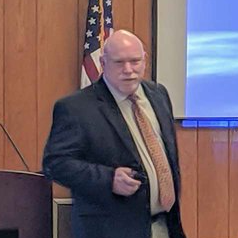By Jack Brammer
NKyTribune reporter
State Chief Medical Examiner Bill Ralston told a legislative panel Tuesday that his office and Northern Kentucky University are working together to put the Northern Kentucky’s medical examiner office on the NKU campus in Highland Heights.
Northern Kentucky has been without a state medical examiner’s office since it closed in March 2018 in Fort Thomas primarily due to staffing problems.
Ralston appeared with Rebecca Norton, budget director of the state Justice and Public Safety Cabinet, before the House Budget Review Subcommittee on Justice, Public Safety and Judiciary.

Bill Ralston, M.D., state chief Medical Examiner.
Gov. Andy Beshear announced last April that, through a bipartisan effort, funding has been appropriated for the state medical examiner’s office to reopen its Northern Kentucky office.
He said it was truly a bipartisan effort, led by Sen. Chris McDaniel, R-Ryland Heights.
The General Assembly approved with Beshear‘s support House Bill 382 last year to dedicates $1.8 million in one-time funds for fiscal year 2022 and more than $1.5 million in continuation funds.
Without a Northern Kentucky office, cases are usually sent to Frankfort and Louisville. That increases caseloads on existing regional medical examiner’s offices that are already over capacity. One other state medical examiner’s office is in Madisonville.
County coroners are unable to sign death certificates until autopsy reports are completed, and without signed death certificates, families are often unable to begin taking care of personal matters.
An office in Northern Kentucky also will save families time and money in transporting loved ones more than 100 miles for a death exam and help law enforcement agencies save time and money.
The Northern Kentucky office would cover from Gallatin to Greenup counties.
The mission of the OSME is to serve all Kentuckians by providing accurate, thorough and efficient medicolegal investigations of death, thereby ensuring justice and providing solace, comfort and protection to the living.
The office also deals with public health impacts by identifying diseases and hazards that could put Kentuckians at risk.
Last year, Beshear said the state medical examiner’s office in 2020 completed 2,851 examinations and were involved in more than 5,000 death investigations across the state.
The Northern Kentucky location anticipates receiving well over 500 examinations annually.

Northern Kentucky University
Ralston said the biggest hurdle probably will be recruiting the two or three forensic pathologists he would want for the office. Their job is to determine the cause of death of a person.
He said there is a nationwide shortage in forensic pathologists, with less than 400 in the United States.
Norton said the state is working with Northern Kentucky University to set up a lease for the medical examiner’s office in a renovated building on the campus.
She said NKU may have more to say about the lease and details at a board meeting in mid-March.
“So far, all the feedback has been positive,” she said, adding there is no completion date at this time.
NKU did not respond to a question seeking comment.



















